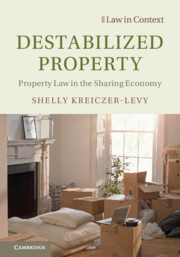Book contents
- Reviews
- Destabilized Property
- The Law in Context Series
- Destabilized Property
- Copyright page
- Dedication
- Contents
- Acknowledgments
- 1 Introduction
- 2 Stability and Property Use
- 3 The Decline of Stability in the New Millennium
- 4 The Rise of the Access Economy
- 5 Access as an Alternative to Ownership
- 6 Fragmentation of Intimate Property
- 7 Evaluating Flexibility in Property Use
- 8 What’s Next? The Future of the Access Economy
- 9 Conclusion
- Index
- Series page
6 - Fragmentation of Intimate Property
Published online by Cambridge University Press: 25 October 2019
- Reviews
- Destabilized Property
- The Law in Context Series
- Destabilized Property
- Copyright page
- Dedication
- Contents
- Acknowledgments
- 1 Introduction
- 2 Stability and Property Use
- 3 The Decline of Stability in the New Millennium
- 4 The Rise of the Access Economy
- 5 Access as an Alternative to Ownership
- 6 Fragmentation of Intimate Property
- 7 Evaluating Flexibility in Property Use
- 8 What’s Next? The Future of the Access Economy
- 9 Conclusion
- Index
- Series page
Summary
This chapter assumes the owner’s perspective regarding the decision to rent out intimate, privately used possessions, which the chapter names “intimate property”. It first critically analyzes the special legal treatment of intimate property as securing attachment and stability. The home is a central example. The chapter then goes on to describe modern challenges to this legal vision, including the tension between the home and the workplace and the rise of domestic work and home businesses. The access economy further complicates this vision. Airbnb, an online tourist marketplace that allows owners to share their homes for a fee, commercializes and destabilizes the meaning of co-living relationships in the home. The home becomes a site for fleeting, temporal interactions with tourists. Stable, intimate relations become intertwined with the commercial and the casual. The access economy thus creates a new conception of intimate property, functioning as a hybrid. It supports emerging personal markets, where intimacy shapes market practices and market practices shape the parties’ understandings of intimacy. This chapter explains the complexity of this fragmented vision, fleshes out the tension between stability and openness, and discusses the possible legal implications for legal regulation and antidiscrimination laws.
- Type
- Chapter
- Information
- Destabilized PropertyProperty Law in the Sharing Economy, pp. 109 - 133Publisher: Cambridge University PressPrint publication year: 2019



